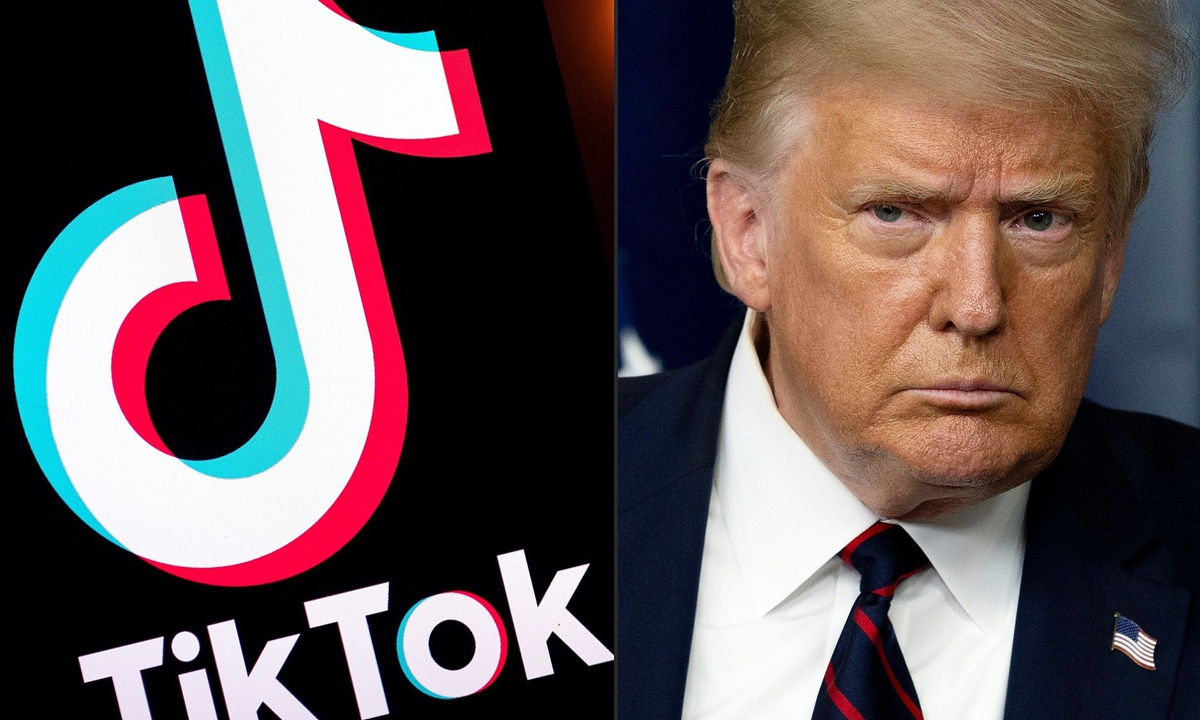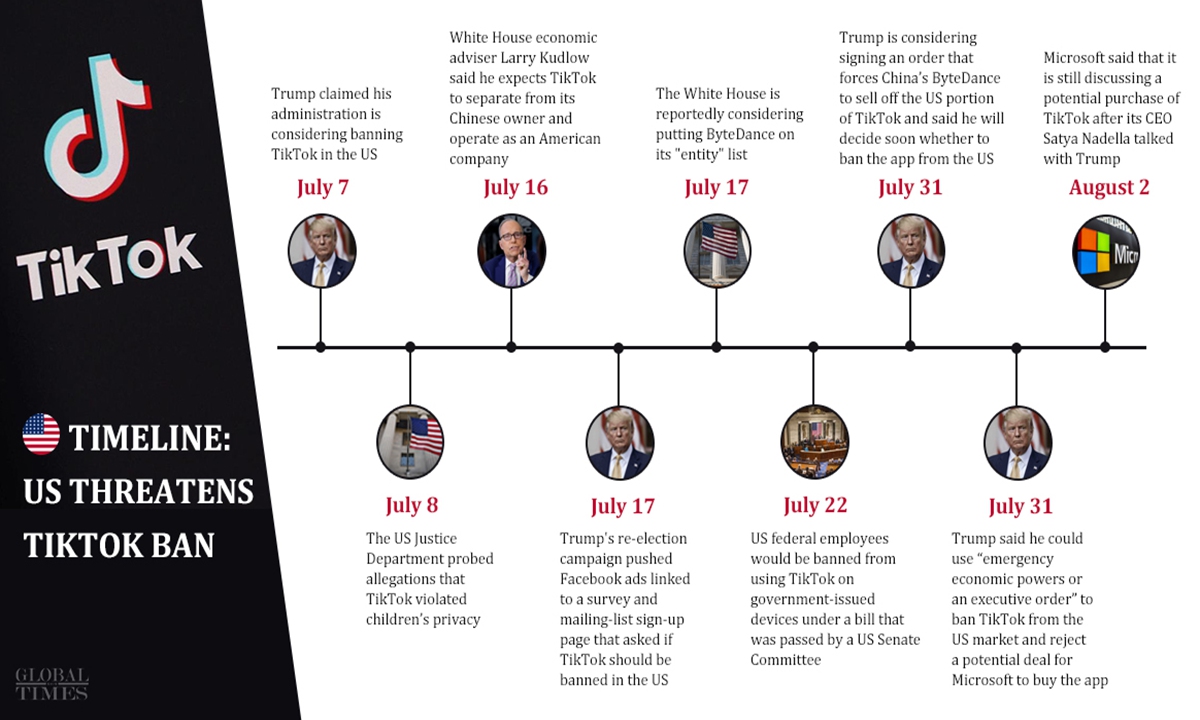US ‘robbery’ of TikTok angers Chinese hi-tech companies
By GT staff reporters Source: Global Times Published: 2020/8/3 23:23:40
Trump’s 45-day deadline turns transaction into fire sale: experts

Photo: VCG
Chinese tech companies entangled in the ever increasingly nasty crackdown waged by the US' Trump administration are mulling to act proactively, the Global Times learnt, with public anger growing on both sides of the Pacific, as the drama of the US forcing the sale of the hugely popular Chinese short-form video platform TikTok morphed one step closer to daylight robbery over the weekend.Since threatening to ban TikTok last week, which reportedly has 100 million American users, US President Donald Trump is giving ByteDance, TikTok's Chinese parent company, 45 days to reach a deal to sell its US business to US software giant Microsoft, Reuters reported on Monday, citing sources.
By slapping a deadline on the potential deal, Trump has effectively turned transaction into a fire sale, further pressuring Beijing-based ByteDance to give up its business interests and intellectual property at a discounted rate.
The drama to forcibly hand the highly successful TikTok over to a US company has drawn widespread criticism across the Pacific, and has become another vivid lesson viewed closely by China's rising tech companies eyeing overseas market expansion amid an escalating tech war between the world's two largest economies which had already seen dozens of Chinese tech firms hit by US blacklist.

A timeline shows how the US pressured ByteDance and threatened to ban TikTok. Washington is clearly concerned about any company that challenges the high-tech hegemony of the US.Infographic: Global Times
Drama continues
In contrast to the usually low profile approach Chinese companies choose when facing US government crackdowns, ByteDance issued an unusually harsh announcement at the early hours on Monday, saying it is facing unimaginable difficulties in the process of growing to be an international company, entangled in international political tension and met with "copying and slandering" from its US competitor Facebook.
Zhou Shijian, a senior research fellow at the Center for US-China Relations at Tsinghua University, said that different from the US government-led crackdown on Chinese technology giant Huawei, the clampdown on TikTok, which could result in TikTok's business ending up in the hands of some US companies, is simply because the US could not accept a Chinese company becoming a winner in the US tech sphere.
TikTok is widely believed to be the first Chinese app that has blazed a trail around the world due to its unique ability to understand users' needs, a feat that had not been achieved by any other Chinese tech juggernaut such as Tencent, Alibaba or Baidu.
The US government's actions toward TikTok has alerted other high-tech Chinese firms, with some emphasizing the importance of maintaining core competitiveness in the face of an utterly unreasonable US administration.
"In the geopolitical fight between China and the US, we, Chinese companies, should drop the illusion and clearly realize that it is undoubtedly naive and foolish to expect our opponents to abide by international rules, sit down and negotiate disputes in a civilized manner," a staff member working at a Beijing-based chip firm, told the Global Times on Monday.
An executive of a leading Chinese high-tech company, who only spoke on the condition of anonymity, told the Global Times on Monday that the move shows Washington is mobilizing political strength to wage a tech war against China.
"This is not the moment to talk about passively defending or keeping a low-profile to avoid US sanctions. Rather, Chinese firms should act proactively, to scale up research and development efforts and beat their US rivals so that American consumers and companies become increasingly dependent on tech supplies from China," the executive said. "This is the right path in which Chinese firms should fight back."
"If Trump's crackdown on Chinese companies shows little effect and instead hurts the key interests of American companies, there will be more maneuvers for communication," the anonymous executive noted.
Zhou said TikTok should bring the case to the New York-based United States Court of International Trade on the grounds of the US' non-market oriented approach and government interference on the matter and the US limiting a foreign company's intellectual property rights (IPR).
"The US government has long portrayed itself as a protector of IPR in its deals with China, and it is odd to see the lack of respect it shows toward the IPR issue when it comes to dealing with a Chinese firm," Zhou said.
China's response
It is more than just TikTok. US Secretary of State Mike Pompeo revealed in a Sunday interview that "in the coming days" the scope of the witch-hunt will be further extended to "countless Chinese apps" specifically mentioning WeChat, a social messaging app developed by Chinese internet giant Tencent.
In a tit-for-tat response, Chinese Foreign Ministry spokesperson Wang Wenbin said on Monday that the US threats of taking action against Chinese tech companies have exposed the US' hypocrisy in maintaining its so-called freedoms and violated the WTO's nondiscrimination principle.
"China firmly opposes discriminatory US policies against Chinese software companies and its tendency to generalize the concept of national security, make guilty presumptions without evidence and politicize economic issues," Wang said.
The US' restrictions on Chinese companies have stirred up angry sentiments among Chinese netizens, who vented their dissatisfaction at comments left under the latest posts of the US Embassy in China on China's social media platforms.
"The US claims that the freedoms inherited from its market economy has an overwhelming edge… and its government won't wantonly interfere in normal market activities between companies. Is this slapping its own face?" a netizen wrote on Monday.
Another Chinese netizen urged other countries to be cautious when cooperating with the US, as "the country has been kidnapped by politics and is the foremost rule-breaker in the world."
After the US shut down the Chinese consulate in Houston, the US Embassy's Weibo account attracted a substantial amount of daily traffic from Chinese netizens, who jeered at the hypocrisy and double standards shown by the Trump Administration with the platform becoming a barometer of Chinese public opinion.
Risk factor
Zhou said Chinese tech companies that have ambitions to explore international markets should treat Huawei as an example, although there is a difference between the telecommunications giant that provides both hardware and software, and other "pure" software firms.
"All Chinese firms should learn from Huawei, which has proven to be a rock that has cracked the many eggs that the US has thrown upon it," Zhou said, noting Huawei's secret is that it has long prepared for a rainy day scenario and emphasized mastering core technologies.
A tech war is ultimately about a talent war. Yi Beichen, a veteran mobile internet observer, told the Global Times on Monday that amid the narrowed scope of China-US education cooperation, there is chance that the best talent for the next decade may come out of the Chinese mainland, the forefront of global technological innovation.
Chen Da, an executive director with Shanghai-based Anlan Capital, said it is a remarkable sign of progress to see a Chinese software firm engage in a turf fight with a US tech giant such as Facebook.
However, Chen, who is familiar with the landscape of Chinese tech firms in the US, said Chinese companies should never, in their overseas expansion, overlook compliance issues so that no potential legal loopholes are left to be explored by others given the rising headwinds of the China-US tech war.
RELATED ARTICLES: